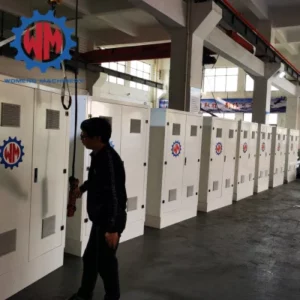Maintaining an sanitary pants production machine involves several key maintenance tasks to ensure its optimal performance and longevity:
- Regular Cleaning: Periodic cleaning of the machine components, including removing dust, debris, and residual materials, helps prevent buildup that can affect performance.
- Lubrication: Proper lubrication of moving parts reduces friction, wear, and tear, prolonging the lifespan of critical components. It’s essential to follow manufacturer-recommended lubrication schedules and use approved lubricants.
- Inspecting Wear Parts: Components like cutting blades, seals, or belts may experience wear over time. Regular inspection and timely replacement of these parts prevent breakdowns and ensure consistent quality.
- Calibration and Adjustment: Ensuring the machine is calibrated correctly for different sizes, configurations, or materials used in sanitary pants production is vital for maintaining product quality. Regular adjustments based on production requirements are necessary.
- Electrical and Mechanical Checks: Routine checks of electrical connections, sensors, actuators, and mechanical parts help identify potential issues early and prevent unexpected downtime.
- Quality Control Systems Calibration: Checking and calibrating quality control systems, such as sensors for detecting defects or irregularities in the pants, ensures accurate performance during production.
- Operator Training and Awareness: Properly trained operators who understand maintenance procedures and can recognize early signs of issues play a crucial role in maintaining machine health.
- Scheduled Preventive Maintenance: Following a structured preventive maintenance schedule, as outlined by the manufacturer, helps identify and address potential problems before they escalate.
- Documentation and Record-Keeping: Maintaining records of maintenance activities, repairs, and component replacements helps track the machine’s performance history and aids in future maintenance planning.
- Environmental Considerations: Ensuring the machine’s operating environment meets recommended conditions (temperature, humidity, cleanliness) helps prevent premature wear or damage to components.
Adhering to a comprehensive maintenance plan, including routine checks, timely repairs, and preventive measures, is essential for ensuring the sanitary pants production machine operates optimally, maintains efficiency, and produces high-quality products consistently.
Are there specific certifications or compliance standards the machine adheres to?
Yes, manufacturers of sanitary pants production machines often adhere to various certifications and compliance standards to ensure quality, safety, and adherence to industry regulations. Some relevant certifications and standards include:
- ISO Standards: Manufacturers may comply with ISO (International Organization for Standardization) standards relevant to the industry, such as ISO 9001 (Quality Management Systems) for ensuring consistent quality in manufacturing processes.
- CE Marking: The CE mark indicates conformity with health, safety, and environmental protection standards within the European Economic Area, ensuring compliance with applicable directives for machinery safety.
- Safety Standards: Adherence to safety standards specific to machinery and equipment, sanitary pants for ladies such as ANSI (American National Standards Institute) standards or EN (European Norm) standards, ensures safety in design and operation.
- Health Regulations: Compliance with health regulations and guidelines related to the production of hygiene products, including regulations on materials used in contact with skin, such as REACH (Registration, Evaluation, Authorization, and Restriction of Chemicals).
- Environmental Standards: Adherence to environmental standards and regulations regarding waste disposal, energy efficiency, and the use of environmentally friendly materials or production processes.
- Product Quality Certifications: Some manufacturers might obtain certifications specifically related to product quality or performance, ensuring that the machines meet or exceed certain quality benchmarks.
- Industry-Specific Compliance: Compliance with industry-specific standards set by organizations or associations dedicated to hygiene product manufacturing, ensuring adherence to best practices and industry norms.
Certifications and compliance with these standards demonstrate a commitment to quality, safety, and adherence to regulations, providing assurance to buyers that the sanitary pants production machines meet specified criteria and are suitable for use in hygiene product manufacturing.

